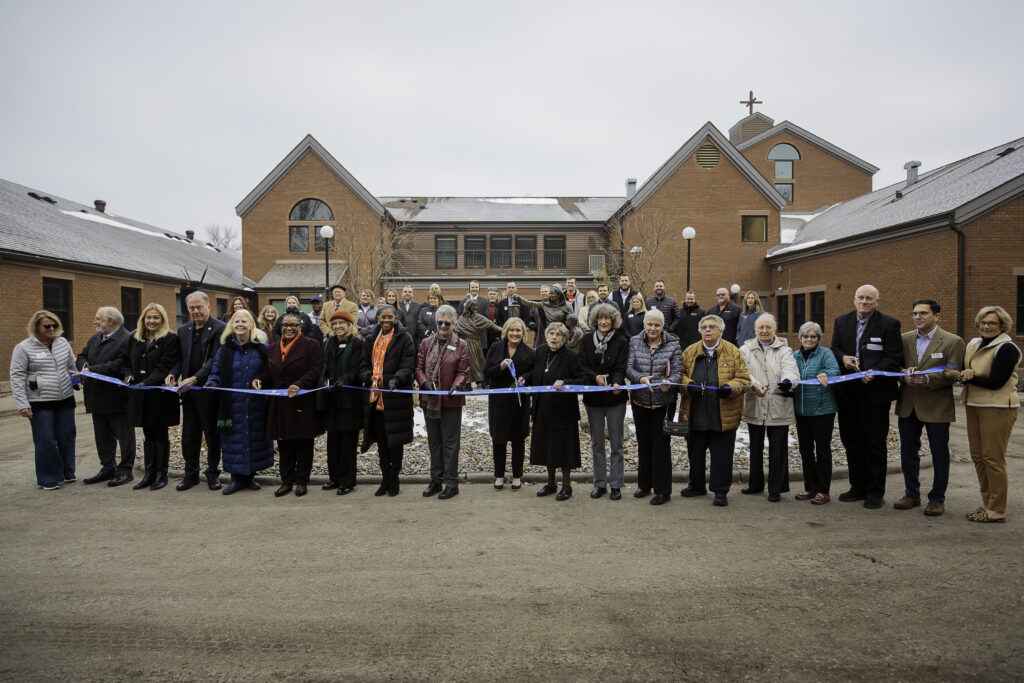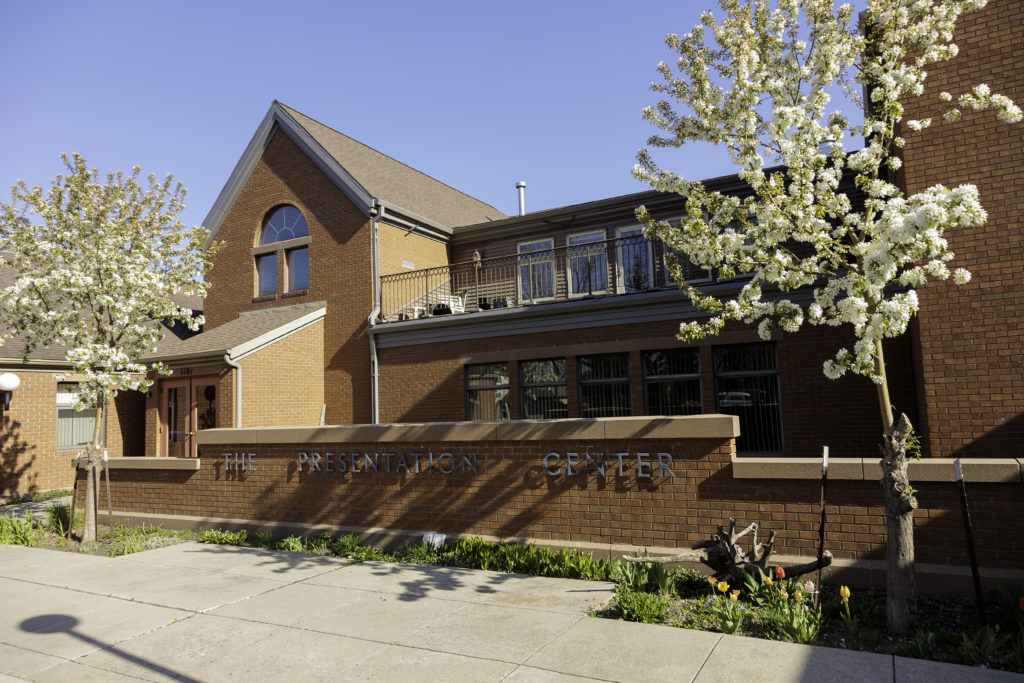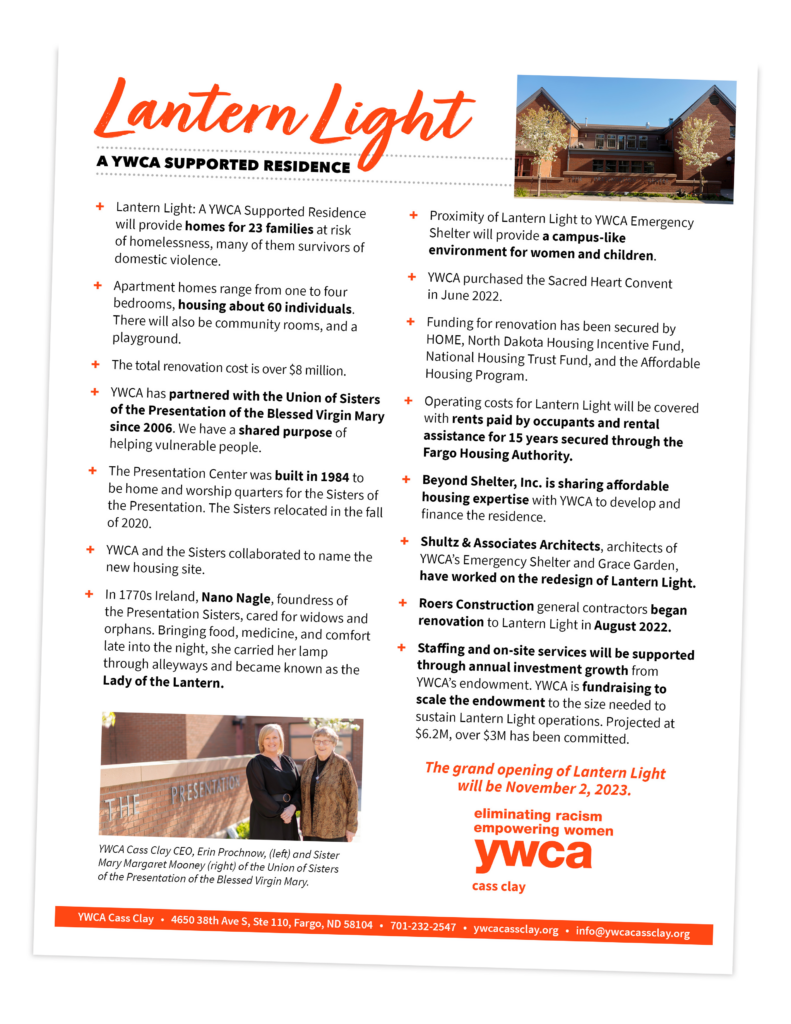Thank You to everyone who joined us at the grand opening and ribbon cutting on November 2!

YOU can Shine a Light at Lantern Light!
There is power in having a place to call home: when applying for a job, keeping kids in school, building credit history, and gaining financial security.
You can welcome families to their new homes and make a difference by helping outfit apartments with:
- Kitchen, bath, and bedroom items
- Décor
- Towels and rugs
- Cleaning supplies and more!
Email info@ywcacassclay.org for more information.

Other ways to support Lantern Light
Make a financial contribution of any amount and YWCA will shop for needed household items.
Give the gift of time when you volunteer to help get Lantern Light ready for families and staff.

In May 2021, we announced plans to bring new, safe, and affordable housing in Fargo at the former convent building of the Union of Sisters of the Presentation of the Blessed Virgin Mary.
The one- to four-bedroom spaces at Lantern Light will be home for approximately 60. YWCA staff will have a presence onsite to help women as they overcome barriers they encounter in life.
Frequently Asked Questions
No. It is affordable housing with support services and no defined deadline for program exit. Residents pay up to 30 percent of their annual income toward their rent and receive supportive services. YWCA Emergency Shelter is different in that it offers urgent shelter and crisis services.
A common thread Lantern Light shares with a shelter stay is the human aspect of a caring and professional YWCA support advocate or case manager.
Survivors often lack the building blocks of independence: a living wage, savings to weather life’s emergencies, adequate credit, and access to childcare and transportation. In 2022, the average YWCA Emergency Shelter stay was 50 days. Many will find jobs and make significant progress in these weeks, yet it’s not enough time to heal and reach financial stability.
Supportive housing is a particular need of domestic violence survivors, challenged by a prioritization system used by HUD and local shelters that first place people who’ve been chronically homeless. Often, those fleeing domestic violence are homeless for the first time. Lantern Light has flexibility to more quickly house survivors of domestic violence.
Local data clearly supports YWCA’s Housing Program expansion. Our area seriously lacks affordable rental homes. In Cass County, 39.8% of households were cost burdened in 2020. The term cost-burdened means more than 30% of monthly income applies to rent. Cost-burdened homes sometimes face tough choices and must sacrifice food, car insurance, or medical care to pay rent … or face eviction.
What’s more, lower-income households are the population segment growing fastest in Cass County. Seventeen percent of households (13,383 of our total 78,672 households) made less than $26,000 annually and were categorized “Extremely Low Income” in the 2020 Census. Already direly short of affordable options, these households are forecast to grow 7.6% or another 1,023 households by 2025. Sixteen percent of households earned $26,000-$43,450 annually and, categorized “Very Low Income,” will grow 8.4%, or another 1,046 households. That means more than 2,000 new, affordable homes are needed.
At YWCA, supportive housing costs far less than shelter:
- $66 for a night of shelter
- $18 for a night of supportive housing
Since 1990, YWCA supportive housing has been a proven solution. A woman who participates in the program earns more money, is healthier, and is better equipped to maintain housing and create a family where children thrive. Survivors of domestic violence have time to resolve complete financial ruin by abusers, often navigating single parenthood as the sole income provider. For some, the timeline is lengthy and challenging, and the stability of housing across months and years is what it takes to end poverty for her and the next generation.
YWCA Supportive Housing has helped thousands to become healthier, secure better jobs, stay employed, engage with teachers and schools, maintain an apartment, gain justice through court prosecution of violent abusers, build better credit, save for reliable cars, and accomplish many other successes. For children, it has meant a dinner table where there are family meals and space for homework. They have warm beds and a real home where friends come over to play. Home has been at the heart of their healthy development.
Supportive housing brings affordable homes coupled with YWCA services to survivors of domestic violence and homelessness. In this special housing, women and children can live safely, heal, and gain new skills to live with the greatest possible independence. At the same time, children grow up in safe home environments that are essential to ending cycles of poverty and violence.
Supportive housing prevents dangerous homelessness or return to abusers - both carrying high human cost as well as costs that accrue to the community through expensive emergency care, law enforcement involvement, and other systems.
Just like YWCA Shelter, Lantern Light will provide caring advocacy services. Professionals are trained to navigate community resources, troubleshoot life’s challenges, and offer a voice of encouragement to help individuals and families feel steady and assured. Other services include:
- Resources and coaching to find jobs, training, or education
- Nursing services
- Transportation assistance
- Childcare assistance
- Staple food items on an individual basis
- Basic need items like shampoo and household cleaning supplies donated by community members
The community is invited to “Shine a Light” at Lantern Light and be the first to welcome families to their new homes. You can make a difference by helping outfit apartments with kitchen, bath, and bedroom items, décor, towels and rugs, cleaning supplies, and more. This is a great opportunity for businesses, clubs, and church groups! Get started by visiting www.ywcacassclay.org/lanternlight and filling out the interest form. A YWCA team member will follow up about what’s needed and how to deliver your gift.
You are also invited to ignite an eternal flame at Lantern Light to ensure the supportive services survivors of violence and homelessness need are available when they need them. YWCA is halfway to our goal of building a $6.2M endowment to support the families who will be served at Lantern Light into perpetuity. Contact Jill at 701.478.2250 or jdevries@ywcacassclay.org to learn more.

